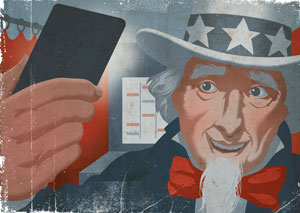Law banning ballot selfies violates First Amendment, federal appeals court says

Illustration by Sam Ward
A federal appeals court has overturned a law that banned New Hampshire voters from taking and posting selfies of their marked ballots.
The Boston-based 1st U.S. Circuit Court of Appeals ruled (PDF) on Wednesday that the law violated the First Amendment. “Ballot selfies have taken on a special communicative value: they both express support for a candidate and communicate that the voter has in fact given his or her vote to that candidate,” the appeals court said.
The ban on ballot selfies was intended to stop vote buying and voter intimidation, according to the opinion. The law imposed a fine of up to $1,000 for violations.
The law is not narrowly tailored because it reaches all voters, not just those who are intimidated or willing to sell their votes, the court said. Nor had the state demonstrated that other laws banning vote corruption were failing to curtail the problem.
“New Hampshire may not impose such a broad restriction on speech by banning ballot selfies in order to combat an unsubstantiated and hypothetical danger,” the appeals court said. “We repeat the old adage: ‘A picture is worth a thousand words.’ “
The three plaintiffs who challenged the law were a New Hampshire state representative, a candidate for state representative, and a voter who cast a write-in vote for his dog. All posted photos of their ballots online. They were represented by the American Civil Liberties Union of New Hampshire.
The case is Rideout v. Gardner. The Wall Street Journal, Politico and Ars Technica covered the decision.
Related article:
ABA Journal: “States seek to stop voters from posting ballot selfies”



